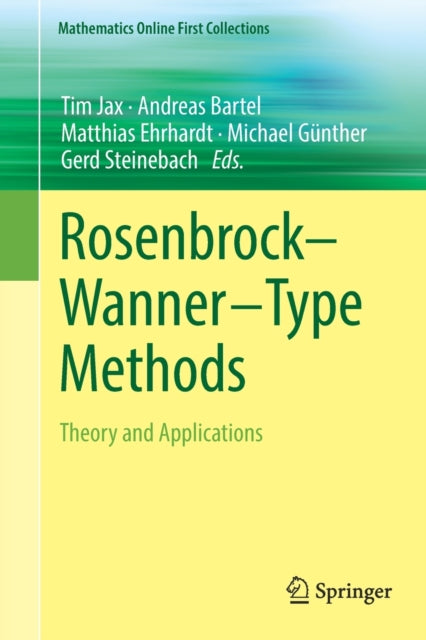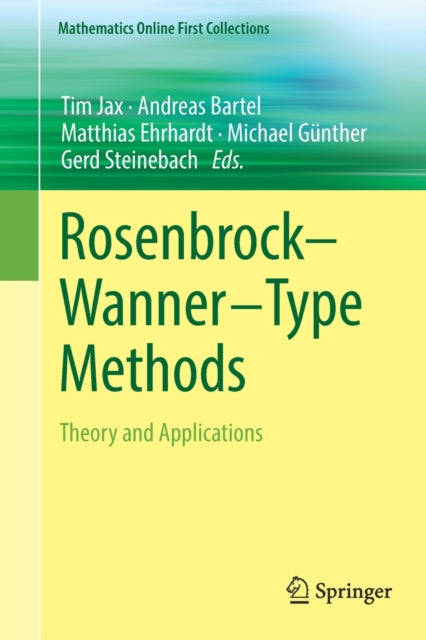Shulph Ink
Rosenbrock-Wanner-Type Methods: Theory and Applications
Rosenbrock-Wanner-Type Methods: Theory and Applications
💎 Earn 199 Points when you buy this item.
YOU SAVE £5.15
- Condition: Brand new
- UK Delivery times: Usually arrives within 2 - 3 working days
- UK Shipping: Fee starts at £2.39. Subject to product weight & dimension
Bulk ordering. Want 15 or more copies? Get a personalised quote and bigger discounts. Learn more about bulk orders.
Couldn't load pickup availability
- More about Rosenbrock-Wanner-Type Methods: Theory and Applications
This book discusses the development of Rosenbrock-Wanner methods, including classical methods, novel W-methods, two-step methods, and exponential Rosenbrock methods, with applications in water and hydrogen network simulation and visual computing.
Format: Paperback / softback
Length: 120 pages
Publication date: 25 July 2021
Publisher: Springer Nature Switzerland AG
This comprehensive book delves into the evolution of the Rosenbrock-Wanner methods, tracing their origins from the initial concept to the present-day research focused on achieving stable and efficient numerical solutions for differential-algebraic systems of equations. The reader is provided with a thorough exploration of both classical methods and the development of novel W-methods, including two-step and exponential Rosenbrock methods. Additionally, descriptive applications from the domains of water and hydrogen network simulation and visual computing are showcased, offering valuable insights into the practical applications of these mathematical techniques.
The Rosenbrock-Wanner methods have undergone significant development since their inception, evolving into powerful tools for solving differential-algebraic equations. These methods are based on the idea of minimizing a functional, often referred to as the residual, which represents the difference between the solution and the exact solution of the equation. The initial Rosenbrock method, proposed by William Rosenbrock in 1942, was a first-order method that employed a line search technique to find a local minimum of the residual. However, it had limitations, such as slow convergence and the potential for getting stuck in local minima.
To overcome these drawbacks, various modifications and extensions of the Rosenbrock method have been developed. One notable improvement was the introduction of the second-order accurate W-method, proposed by John Wanner in 1958. The W-method employed a trust region technique to refine the initial guess and improve the convergence rate. It also introduced the concept of inexact line searches, which allowed for more flexibility in finding the solution.
In the subsequent years, researchers continued to refine and enhance the Rosenbrock-Wanner methods. One important development was the introduction of two-step methods, such as the inexact Newton method and the inexact secant method, which combine the advantages of the Rosenbrock and W-methods. These methods combine the steepest descent and trust region techniques to achieve faster convergence and better accuracy.
Exponential Rosenbrock methods, which combine the ideas of the W-method and the inexact line search, have also been developed. These methods are particularly useful for solving equations with non-linear terms and complex solutions. They employ a combination of inexact line searches and trust region techniques to find the solution efficiently.
In addition to the development of new methods, researchers have also explored the properties and behavior of the Rosenbrock-Wanner methods. They have studied their stability, convergence rates, and accuracy, and have developed techniques to improve their performance in various applications. For example, adaptive algorithms have been developed to adjust the step size based on the condition of the equation, ensuring faster convergence and better accuracy.
The Rosenbrock-Wanner methods have found wide applications in various fields, including engineering, physics, and mathematics. They are particularly useful for solving systems of equations that involve non-linear terms, complex solutions, and optimization problems. For example, they are used in the simulation of fluid flow in pipes, the modeling of chemical reactions, and the optimization of energy systems.
Furthermore, the Rosenbrock-Wanner methods have been extended to solve differential-algebraic equations with multiple variables. These methods, known as multidimensional Newton methods, combine the ideas of the Rosenbrock and W-methods to solve systems of equations with higher degrees of freedom. They have been used in the simulation of complex physical systems, such as the dynamics of planets and galaxies.
In conclusion, the Rosenbrock-Wanner methods have played a crucial role systems in the development of numerical analysis and have contributed significantly to the solution of differential-algebraic equations. These methods have undergone a remarkable evolution, from the initial Rosenbrock method to the present-day research focused on achieving stable and efficient numerical solutions for differential-algebraic systems of equations. The reader is provided with a comprehensive exploration of both classical methods and the development of novel W-methods, including two-step and exponential Rosenbrock methods. Additionally, descriptive applications from the domains of water and hydrogen network simulation and visual computing are showcased, offering valuable insights into the practical applications of these mathematical techniques.
Weight: 209g
Dimension: 235 x 155 (mm)
ISBN-13: 9783030768096
Edition number: 1st ed. 2021
This item can be found in:
UK and International shipping information
UK and International shipping information
UK Delivery and returns information:
- Delivery within 2 - 3 days when ordering in the UK.
- Shipping fee for UK customers from £2.39. Fully tracked shipping service available.
- Returns policy: Return within 30 days of receipt for full refund.
International deliveries:
Shulph Ink now ships to Australia, Belgium, Canada, France, Germany, Ireland, Italy, India, Luxembourg Saudi Arabia, Singapore, Spain, Netherlands, New Zealand, United Arab Emirates, United States of America.
- Delivery times: within 5 - 10 days for international orders.
- Shipping fee: charges vary for overseas orders. Only tracked services are available for most international orders. Some countries have untracked shipping options.
- Customs charges: If ordering to addresses outside the United Kingdom, you may or may not incur additional customs and duties fees during local delivery.


 Excellent
Excellent